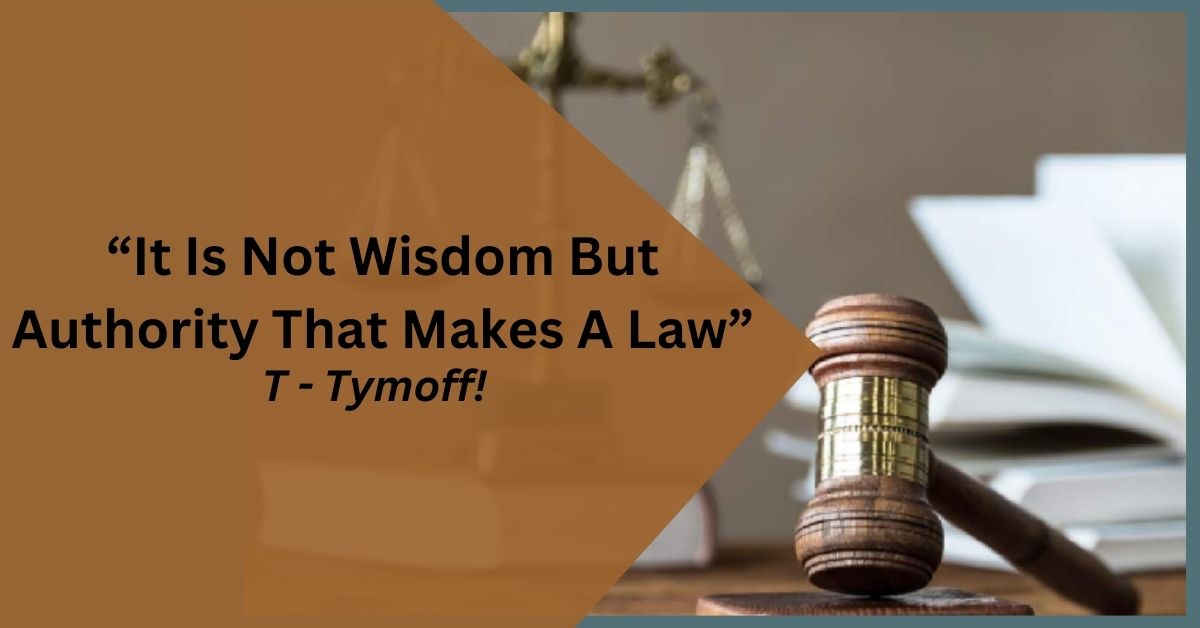Authority Prevails: It is not Wisdom but Authority that makes a Law. T – Tymoff

In the realm of legal philosophy, the relationship between wisdom and authority has been a subject of profound inquiry. Attributed to Tymoff, the maxim “It is not Wisdom but Authority that makes a Law. T – Tymoff” encapsulates this discourse, sparking debates about the origins and legitimacy of legal constructs. This article delves into the depths of this maxim, exploring how authority prevails in shaping laws and its implications for society.
Understanding the Interplay
Legal systems are intricate webs of rules and regulations designed to uphold justice and order. While wisdom may inform the creation of laws, it is authority that ultimately enforces and legitimizes them. Authority, whether vested in a sovereign, legislative body, or judiciary, is the cornerstone of legal governance, dictating the scope of rights and obligations within society. This authority emanates from various sources, including constitutions, statutes, and judicial precedents, providing the framework for legal legitimacy.
The Influence of Authority
Authority permeates every facet of the legal landscape, from the interpretation of statutes to the administration of justice. It dictates the allocation of legal rights and responsibilities, shapes legal reasoning, and ensures compliance through enforcement mechanisms. Moreover, the perceived legitimacy of legal norms often hinges on the authority of those promulgating them, highlighting the symbiotic relationship between authority and obedience within society. Historical and contemporary examples demonstrate how authority can supersede individual wisdom or moral reasoning in shaping legal outcomes, underscoring its pervasive influence.
Case Studies
Examining case studies from various jurisdictions offers insights into how authority shapes legal constructs. Landmark judicial decisions, legislative enactments, and administrative rulings illustrate the intricate interplay between wisdom and authority in legal systems. For instance, constitutional law evolves over time, reflecting shifts in societal values and the distribution of authority. Landmark decisions often redefine the boundaries of governmental power and individual rights, shaping the course of legal governance.
Challenges and Critiques
However, the predominance of authority in legal systems is not without its challenges and critiques. Critics argue that an overemphasis on authority can stifle innovation, perpetuate injustices, and erode individual autonomy. Moreover, the arbitrary exercise of authority, divorced from wisdom or moral principles, can undermine public trust in legal institutions and foster social unrest. Balancing the imperatives of authority and wisdom is essential for fostering equitable and just legal regimes.
Navigating the Balance
Finding the right balance between authority and wisdom is a perpetual challenge for legal scholars, policymakers, and practitioners. While authority provides structure and coherence to legal systems, wisdom ensures their adaptability and responsiveness to societal needs. Striking a harmonious balance between these competing imperatives is crucial for fostering inclusive and participatory approaches to lawmaking and governance. By harnessing the collective wisdom of diverse stakeholders, societies can forge legal constructs that uphold justice, promote human rights, and safeguard the rule of law.
aiotechnical.com health & beauty
The Way Forward
As societies grapple with complex legal issues, the maxim “It is not Wisdom but Authority that makes a Law” serves as a poignant reminder of the inherent tensions within legal systems. Embracing a nuanced understanding of authority’s role can inform more inclusive and participatory approaches to governance. By integrating wisdom, authority, and the collective aspirations of humanity, societies can navigate the complexities of the modern era and strive towards a more equitable and just future.
Conclusion
In conclusion, the interplay between wisdom and authority lies at the heart of legal systems worldwide. While wisdom may inspire just laws, it is authority that gives them legal force and legitimacy. By critically examining this dynamic, societies can navigate the complexities of legal governance and foster inclusive and participatory approaches to lawmaking. As we confront the challenges of the modern era, let us heed the lessons of history and embrace a holistic approach to governance—one that integrates wisdom, authority, and the collective will of society.
also check: What Does A Personal Injury Lawyer Do? Unpacking The Role






